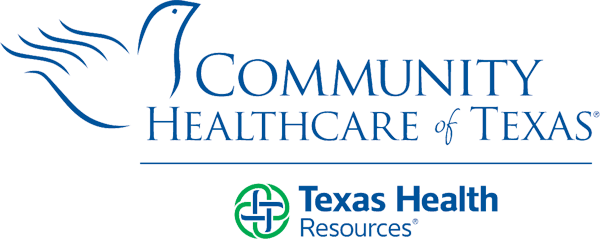A Day in the Life of a Hospice Social Worker

At Community Healthcare of Texas, our social workers are integral members of the interdisciplinary team focusing on the individual needs of our patients, their caregivers, and loved ones. They are licensed professionals specifically trained to come alongside families during their most difficult moments.
We recently spoke with Community Healthcare of Texas Social Worker Cheryl McCutchan about her role and how she supports patients and their families during their end-of-life journey.
Why did you choose a career in social work?
Social work is a second career for me. I worked for a large financial corporation doing regulatory compliance, audit, and program management for 17 years. I learned so much through working with a wide variety of people and institutions during that time and am grateful for the experience, but my heart never felt fully connected to the work. I went back to college and learned that social work focuses on improving the well-being of individuals, families, and communities. My heart feels thoroughly connected to my work now.
What led you to hospice?
My parents were primary caregivers of all four of my grandparents at end of life. Seeing how difficult it was for my parents to manage their physical and emotional care without resources left a lasting impact. When I had the opportunity to intern with a hospice and palliative care program during graduate school, I immediately knew this was my calling. I saw how a team of caring professionals coming together to support a family during their most difficult moments made the journey just a little more bearable. I also saw that just about every hospice employee I met, nurses, social workers, or chaplains, shared the same passion and drive to improve quality of life and lighten the load for those carrying heavy burdens. These are definitely my people!
How do you support patients and families?
I provide a wide variety of services to patients and families in my role as a social worker. I am responsible for assessing the complex needs of families to understand the things that make focusing on enjoying their last days with their loved one difficult. Sometimes that’s connecting them to community resources to address basic needs like financial assistance for food and shelter. Sometimes it’s providing supportive grief counseling or helping families navigate challenging conversations and emotional situations. I also help with advance care planning, assist with final arrangements, advocate for patient and family needs, assist with Medicaid and SNAP benefit applications, etc. I almost always end my initial visits by telling families that if there is a stress or a burden that becomes heavy on their heart, speak up. My job as a social worker is to walk alongside a family and advocate for improved quality of life every step of the way.
What is your favorite part of your job?
It’s hard to narrow it down, but one of the favorite parts of my job is learning what is most important to the patient and family at end of life and working to find ways to honor their priorities. I find that often patients come to us after long treatment journeys where they did not feel they had a lot of agency in making decisions about their care or even their day-to-day lives. Finding ways to make their days their own again as much as possible is so important.
What does a typical day look like for you?
Every day is different, and I love that about this job. Here is just one recent day, start to finish:
- I started the day by stopping at Cancer Care Services to pick up supplemental nutrition shakes for a family struggling to make ends meet.
- I completed an initial assessment with a new patient and her daughter and learned that the current group home she resides in might not be the best fit.
- I researched alternative placement opportunities, narrowed down options for the patient’s daughter, and collaborated with our amazing office staff to provide the necessary documentation for facilities to review, communicating each step of the process with the patient’s daughter.
- I visited with a patient who has been on service for some time and learned that he is now experiencing financial strain. Provided education on community resources and assisted him with completing an application for Project 4031, a local nonprofit that supports hospice patients with basic needs or a dream.
- I visited with a patient and her son who expressed grief at no longer being able to get out in the community to have dinner in a restaurant because transferring in and out of a wheelchair to a car has become too difficult. Provided education regarding mobility impaired transit and assisted with setting up his first trip.
- I assisted a patient with the completion of advance directives, including an Out of Hospital Do Not Resuscitate Order and Medical Power of Attorney, obtained the physician’s signature on the order, and returned the document to the patient.
- I facilitated a difficult family discussion with members of a family who were not yet in agreement on the best way to provide care to a patient.
- I provided supportive counseling and emotional support to a patient’s spouse struggling with caregiver fatigue and anticipatory grief.
What is one of your most memorable experiences with a patient?
I met a patient not long after I started at Community Healthcare of Texas who adored garage sales and flea market shopping as well as holding her own garage sales to share her treasures. She had been planning for a final sale with items stacked floor to ceiling in her apartment when cancer began to steal her energy. She was worried that her treasures might be treated like trash after her death. The employees of CHOT came together to organize a garage sale where her precious finds were sold to other treasure hunters. The funds raised at the sale were donated back to the patient, who used those funds to take care of her final arrangements and receive one last pedicure at home. This brought great joy both to her and my fabulous colleagues.
What advice do you have for a patient and their family facing a serious or life-limiting illness?
Take advantage of every last resource and offer of help extended to you so that you may truly live your best life through your last day. Too often, patients and families are concerned about burdening others. Asking for and receiving help can be difficult, but it is a gift both to you and the people that love you to accept these offers.
To learn more about Community Healthcare of Texas, contact us today at (800)226-0373.
![Community Healthcare of Texas [logo]](https://www.chot.org/wp-content/themes/community-healthcare-of-texas-2019/images/logo.png)




